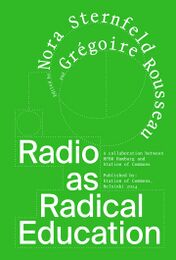User:Eleni/Radio as Radical Education: Difference between revisions
| Line 13: | Line 13: | ||
↘ ''how radio was instrumental as it <mark style="background-color:#a0fe99">“brought the nation to life and endowed every citizen with a new status.”</mark>'' | ↘ ''how radio was instrumental as it <mark style="background-color:#a0fe99">“brought the nation to life and endowed every citizen with a new status.”</mark>'' | ||
↘ '''narrowcasting''' opposite of broadcasting? | |||
Revision as of 15:03, 18 October 2024
if you are curious, you can find the full text here or on the bootleg library
A Polyphonic Voice Responding. Introduction
↘ It [the book] brings together the voices and ideas of people who have worked on and with and in radio while understanding their radio projects as education projects or understanding radio as radical education.
↘ Station of Commons was initiated at the beginning of the pandemic in 2020. It’s a research platform on digital commoning practices with a very strong emphasis on audio and radio practice.
↘ The radical education approach wasn’t something we developed deliberately, but something that emerged from the practice itself as we tried to understand how a collective can learn and how this learning can then be shared. This idea of sharing encompasses the idea of communication, the idea of distribution.
↘ trans-local is a new term for me, what does it mean? add to the glossary
↘ how radio was instrumental as it “brought the nation to life and endowed every citizen with a new status.”
↘ narrowcasting opposite of broadcasting?

